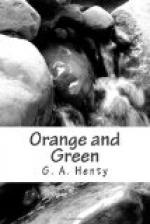The Irish generals had thought that Ginckle’s movement was but a repetition of the previous raid, and the force that had been sent over to guard the head of the bridge was altogether insufficient to withstand the determined attack by Ginckle’s force. Reinforcements were now sent across the bridge, but this only added to the confusion. Pressed back by the weight and power of the English attack, the Irish were beginning to retire across the bridge, when they met the reinforcements making their way over.
The bridge was of great length, but extremely narrow, and a complete block took place. The English had pierced their way through the struggling mass at the head of the bridge, and pressed on the rear of the mass of fugitives, literally hewing their way through them, and the pressure became so great that the regiments crossing were carried back. The head of the British column was pushed forward by those behind, and could only advance by slaying those in front of them and throwing their bodies over the bridge; for the mass were wedged so tightly that movement had now become impossible, while the Irish, as they retreated, formed ramparts of the slain and impeded the advance of the enemy.
While the struggle on the bridge was at its fiercest, the French officer who commanded at the drawbridge across the arch nearest to the city, fearing that the British would press in at the rear of the Irish, and that he might not then be able to raise the drawbridge, ordered this to be done at once—thereby cutting off the retreat of the soldiers still on the bridge. These jumped over the parapet into the river, and strove to reach the city wall by swimming. Some did so, but great numbers were drowned. This incident greatly increased the standing feud between the Irish and French, the former declaring that the latter not only never fought themselves, but were ready, at the first alarm, to sacrifice their allies in order to secure their own safety.
The success of Ginckle’s second raid had been complete, in so far that he had inflicted great slaughter upon the Irish infantry, and had gained a moral victory; but he was no nearer capturing the town. An attack across the long narrow bridge was not even to be thought of; and he again retired across the river.
The Irish were disheartened. Sarsfield, though a dashing cavalry commander, appeared wholly incapable of handling large bodies of men. Ginckle had twice given him a great opportunity, but on neither occasion had he made the slightest effort to utilize it.
On the first occasion, surprise and uncertainty might excuse inaction on the part of the army in Limerick, but there was no such excuse the second time. Their force outside the town gate was but a small one; it was certain that the English could not push across the bridge; and, as Ginckle had taken the best part of his army across, Sarsfield could have issued out with his whole force on the Limerick side, crushed




